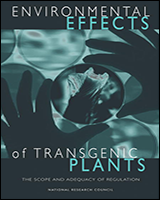NCBI Bookshelf. A service of the National Library of Medicine, National Institutes of Health.
Transgenic crops offer the promise of increased agricultural productivity and better quality foods. But they also raise the specter of harmful environmental effects. In this new book, a panel of experts examines:
- Similarities and differences between crops developed by conventional and transgenic methods
- Potential for commercialized transgenic crops to change both agricultural and nonagricultural landscapes
- How well the U.S. government is regulating transgenic crops to avoid any negative effects.
Environmental Effects of Transgenic Plants provides a wealth of information about transgenic processes, previous experience with the introduction of novel crops, principles of risk assessment and management, the science behind current regulatory schemes, issues in monitoring transgenic products already on the market, and more.
The book discusses public involvement—and public confidence—in biotechnology regulation. And it looks to the future, exploring the potential of genetic engineering and the prospects for environmental effects.
Contents
- THE NATIONAL ACADEMIES
- COMMITTEE ON ENVIRONMENTAL IMPACTS ASSOCIATED WITH COMMERCIALIZATION OF TRANSGENIC PLANTS
- COMMITTEE ON AGRICULTURAL BIOTECHNOLOGY, HEALTH, AND THE ENVIRONMENT
- BOARD ON AGRICULTURE AND NATURAL RESOURCES
- BOARD ON LIFE SCIENCES
- Preface
- Acknowledgments
- Executive Summary
- 1. Ecological, Genetic, and Social Factors Affecting Environmental Assessment of Transgenic Plants
- DEVELOPING A TWENTY-FIRST-CENTURY VIEW OF AGRICULTURE AND THE ENVIRONMENT
- ROLE OF THIS REPORT
- ENVIRONMENTAL EFFECTS OF AGROECOSYSTEMS ON SURROUNDING ECOSYSTEMS
- ENVIRONMENTAL IMPACTS OF THE DELIBERATE INTRODUCTION OF BIOLOGICAL NOVELTY: FROM GENES TO MINICOMMUNITIES
- COMPARING AND CONTRASTING CONVENTIONAL AND TRANSGENIC APPROACHES TO CROP IMPROVEMENT
- OVERVIEW OF CURRENT U.S. REGULATORY FRAMEWORK FOR TRANSGENIC ORGANISMS
- 2. Scientific Assumptions and Premises Underpinning the Regulation and Oversight of Environmental Risks of Transgenic Plants
- 3. APHIS Regulatory Policy for Transgenic Organisms
- 4. Case Studies of APHIS Assessments
- 5. Analysis of APHIS Assessments
- 6. Postcommercialization Testing and Monitoring for Environmental Effects of Transgenic Plants
- INTRODUCTION
- THEORETICAL JUSTIFICATION FOR MONITORING AND VALIDATION AFTER COMMERCIALIZATION OF TRANSGENIC CROPS
- POSTCOMMERCIALIZATION VALIDATION TESTING
- STATUS OF LONG-TERM ENVIRONMENTAL MONITORING IN THE UNITED STATES
- DEVELOPMENT OF MONITORING PROGRAMS FOR TRANSGENIC CROPS
- TRAINED-OBSERVER MONITORING
- LONG-TERM MONITORING AND THE USE OF BIOINDICATORS
- RESPONSES TO MONITORING
- CONCLUSIONS
- 7. The Future of Agricultural Biotechnology
- References
- Appendixes
- About the Authors
- Board on Agriculture and Natural Resources Publications
NOTICE: The project that is the subject of this report was approved by the Gov-erning Board of the National Research Council, whose members are drawn from the councils of the National Academy of Sciences, the National Academy of Engineering, and the Institute of Medicine. The members of the committee responsible for the report were chosen for their special competences and with regard for appropriate balance.
This study was supported by Cooperative Agreements No. 59-0790-0-173 and No. 99-1001-0229-GR between the National Academy of Sciences and the U.S. Department of Agriculture. Any opinions, findings, conclusions, or recommendations expressed in this publication are those of the author(s) and do not necessarily reflect the views of the organizations or agencies that provided support for the project.
- NLM CatalogRelated NLM Catalog Entries
- Review Bacillus thuringiensis (Bt) transgenic crop: an environment friendly insect-pest management strategy.[J Environ Biol. 2008]Review Bacillus thuringiensis (Bt) transgenic crop: an environment friendly insect-pest management strategy.Kumar S, Chandra A, Pandey KC. J Environ Biol. 2008 Sep; 29(5):641-53.
- Regulating transgenic crops sensibly: lessons from plant breeding, biotechnology and genomics.[Nat Biotechnol. 2005]Regulating transgenic crops sensibly: lessons from plant breeding, biotechnology and genomics.Bradford KJ, Van Deynze A, Gutterson N, Parrott W, Strauss SH. Nat Biotechnol. 2005 Apr; 23(4):439-44.
- Review Genomic misconception: a fresh look at the biosafety of transgenic and conventional crops. A plea for a process agnostic regulation.[N Biotechnol. 2014]Review Genomic misconception: a fresh look at the biosafety of transgenic and conventional crops. A plea for a process agnostic regulation.Ammann K. N Biotechnol. 2014 Jan 25; 31(1):1-17. Epub 2013 May 15.
- Review Next biotech plants: new traits, crops, developers and technologies for addressing global challenges.[Crit Rev Biotechnol. 2016]Review Next biotech plants: new traits, crops, developers and technologies for addressing global challenges.Ricroch AE, Hénard-Damave MC. Crit Rev Biotechnol. 2016 Aug; 36(4):675-90. Epub 2015 Feb 2.
- Review Promise and issues of genetically modified crops.[Curr Opin Plant Biol. 2013]Review Promise and issues of genetically modified crops.Chen H, Lin Y. Curr Opin Plant Biol. 2013 May; 16(2):255-60. Epub 2013 Apr 6.
- Environmental Effects of Transgenic PlantsEnvironmental Effects of Transgenic Plants
Your browsing activity is empty.
Activity recording is turned off.
See more...
